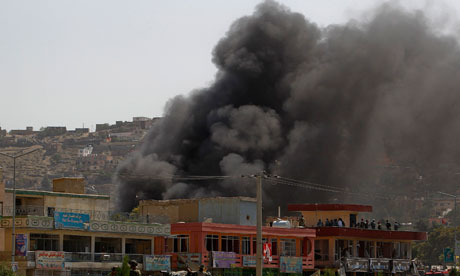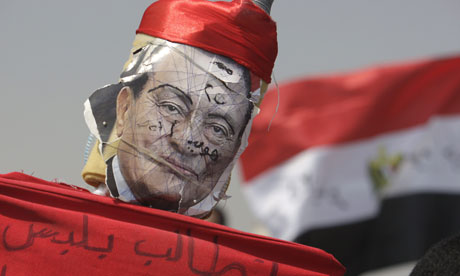What the naysayers got right about the Arab Spring.
By James Traub
 What is the future of the Arab Spring?
What is the future of the Arab Spring?
-James Traub is a contributing writer for the New York Times Magazine and author of, most recently, The Freedom Agenda. "Terms of Engagement," his column for ForeignPolicy.com, runs weekly
By James Traub

Over the last several months, there has been very little good news from the Arab world, and a lot of very bad news: bloody stalemate in Libya, Yemen, and Syria; ruthless repression in Bahrain; ongoing military rule in Egypt; growing restlessness and frustration in Tunisia. The waning of the Arab Spring has been deeply disheartening to both democratic activists in the Middle East and their enthusiasts abroad -- i.e., folks like me. It has, however, offered a gratifying sense of vindication to the stern realists who always viewed the whole thing as a mass delusion. I'm thinking of you, George Friedman.
Friedman is the armchair Metternich of Stratfor, a "global intelligence" firm whose highly informed analyses of world events -- often by former intelligence officials -- have been arriving, uninvited but very welcome, in my e-mail inbox for the last few years. Friedman -- sorry, "Dr. George Friedman" -- is Stratfor's founder and CEO, an international affairs theorist of the old school who views geopolitics as the clash of state interests. The good doctor is thoroughly immune to the American habit of falling in love with democratic movements abroad. In the most recent installment of his "Geopolitical Weekly," Friedman dismisses the idea that the Arab world is now experiencing a "revolution." Elsewhere he has written, "There is no Arab spring, just some demonstrations accompanied by slaughter and extraordinarily vacuous observers."Hear him out. A minimal requirement for a revolution is the upending of an existing regime -- and, as Friedman points out, even in countries like Egypt where the ruler has been forced from office, the military regime remains firmly in power. (His case is weaker in Tunisia.) Compare the situation to the genuine revolution that toppled one regime after another in the former Communist bloc in 1989. There, entire populations overwhelmed despised governments. Much the same happened in Iran in 1979. The Arab world, by contrast, has seen street demonstrations, lead by the young and the well-educated. "The most interesting thing in Egypt," Friedman has written, "is not who demonstrated, but the vast majority who did not." These limited demonstrations succeeded only in persuading the military to get rid of President Hosni Mubarak. Elsewhere, the mass movements have produced stand-offs rather than victories.
Friedman is right that Arab regimes have had far more staying power than democracy advocates in the West naively imagined. Libya is the example par excellence: The Western narrative was that once NATO openly sided with the rebels, the worm-eaten Qaddafi regime would collapse, even if Qaddafi and a few loyalists would fight on to the bitter end. As the bombing continued week after week, some people -- me, for example -- sagely noted that the aerial assault on Kosovo took 76 days to bring Serbia to its knees. About double that time has passed, and only now does Qaddafi's grip on Tripoli appear to have seriously weakened. The Arab Spring has stalled because key sectors -- tribes in Libya and Yemen, business elites and ethnic minorities in Syria, the upper ranks of the military in Egypt -- have either stuck with the regime or stayed on the sidelines.So 2011 is not 1989. What is it then? A flash in the pan? "The key principle that appears to be driving the risings," Friedman wrote in February shortly after Mubarak's fall, "is a feeling" that regimes "enriched themselves beyond what good taste permitted." This is like saying that Marie Antoinette's shepherdess parties provoked the French Revolution. But Mohammed Bouazizi, the Tunisian street vendor, did not set himself on fire because President Zine el Abidine Ben Ali ran a kleptocracy, but because that kleptocracy had destroyed his dignity and reduced his prospects to nothing -- which is more or less why the French stormed the Bastille. Unarmed citizens are braving bullets in Syria not because they feel that President Bashar al-Assad is unseemly, but because they view him as cruel and illegitimate. And while Arab citizens hate their corrupt and contemptuous leaders, they have also stopped accepting the autocratic rules which for so long they took for granted. This force will not be put back in a bottle.
The Arab Spring is, in fact, some kind of revolution; it seems niggling to withhold the term. But what kind? As Friedman notes, some revolutions, like the 1848 uprisings in Europe, do ultimately lead to a liberal transformation, even if regimes weather the first storm of protest. That would be the hopeful precedent. Others, like 1979 in Iran, produce a reactionary transformation. So if you accept the premise that, despite all the frustration and the reversals, something very large is happening in the Middle East which will ultimately lead to a different political order, the second-order question is: What will that order look like? Friedman gloomily concludes that "the places where the risings have the most support are the places that will be least democratic" -- presumably Yemen or Libya -- "while the places where there is the most democratic focus," such as Egypt, "have the weakest risings."Of course, one of the most fundamental differences between Europe in 1989 and the Middle East today is that the former had deep experience of liberal rule and liberal political principles, and the latter has known little beyond autocracy. The tribalism, ethnic fragmentation, and low levels of development that kept the Arab world a democracy-free zone until now also make it unlikely that the old order will soon be supplanted by liberal democracy. Tunisia is not Poland.
But 1989 is an unfair standard. The threshold question should be: Will the new regimes be more liberal, more democratic, more accountable, and less grossly self-aggrandizing than the ones they replace? And the answer is: they could hardly fail to be. To be sure, they could fail either if states descend into chaos or if Islamist extremists gain the upper hand. Both scenarios have been hyped by Arab rulers, who depict themselves as the only bulwark against anarchy or fundamentalism. One could imagine the former happening in Yemen or Libya, and the latter perhaps in Syria. But they are hardly the likeliest outcome. Even Friedman, when he's not lashing out at vacuous observers, acknowledges that the Arab Spring is likely to "plant seeds that will germinate in the coming decades"; he expects those seeds to be democratic, but illiberal.Liberalism does take far longer to evolve than democracy, as Fareed Zakaria points out in his book The Future of Freedom. But democracy of any kind sounds a lot better than the status quo. The Arab Spring is likely to produce better outcomes for Arab peoples. But this brings us to the third-order question: Will these changes, on balance, be positive or negative for the United States and the West?
You don't have to be a cold-blooded realist to believe, as Friedman does, that whatever new regimes come to power will not be sympathetic to the United States. Successive American administrations relied on rulers like Mubarak or King Hussein of Jordan precisely because they could afford to ignore the views of their own people -- which were, and are, deeply anti-American and anti-Israel. To see what democracy is likely to produce one need look no further than Turkey, whose generals were far more pro-American and pro-Western than the current democratic and mildly Islamic regime has proved to be. Already the state press in Egypt has begun to churn out diatribes against America diplomats there. This is almost certain to get worse before it gets better.There are, I suppose, two reasons to dump cold water on the Arab Spring. The first is that you think the enthusiasm is overblown, and you enjoying taunting the romantic spirit that sees reflections of America and its democratic values in every popular uprising across the globe. Go ahead and jeer; I would only note that even the grumpy and skeptical John Quincy Adams, who famously abjured crusades to destroy foreign "monsters," added that the American people are "well-wishers" to those everywhere who seek freedom.
The second reason is that you believe that while it may be good for them, it's bad for us. But in the long term, that cannot be so. Illegitimate government in the Arab world has been a disaster for the neighborhood, and for the world. Legitimate government provides the only narrative powerful enough to prevail over the appeal of extremism. We have every reason to be well-wishers.
-This commentary was published in The Policy Foreign on 19/08/2011-James Traub is a contributing writer for the New York Times Magazine and author of, most recently, The Freedom Agenda. "Terms of Engagement," his column for ForeignPolicy.com, runs weekly



